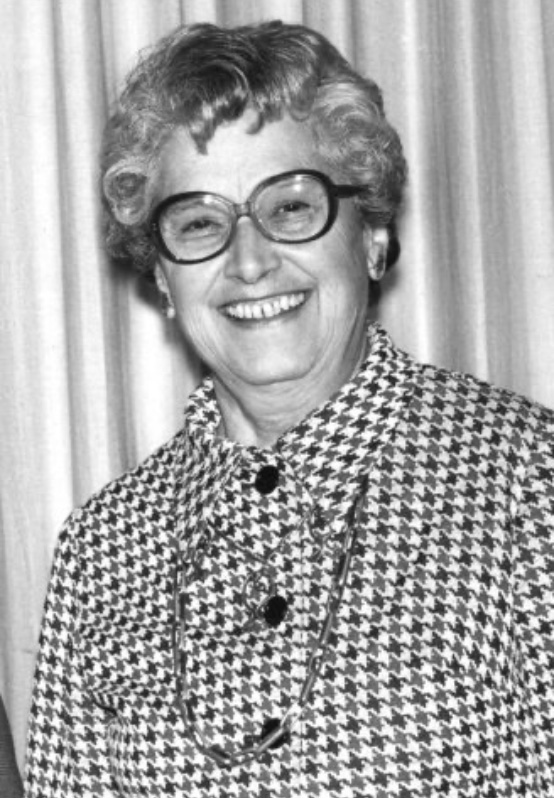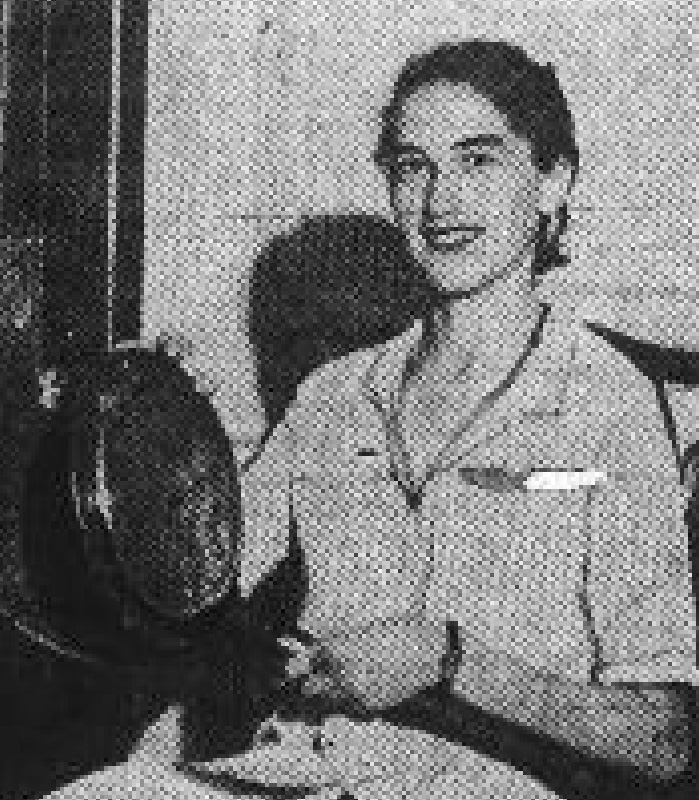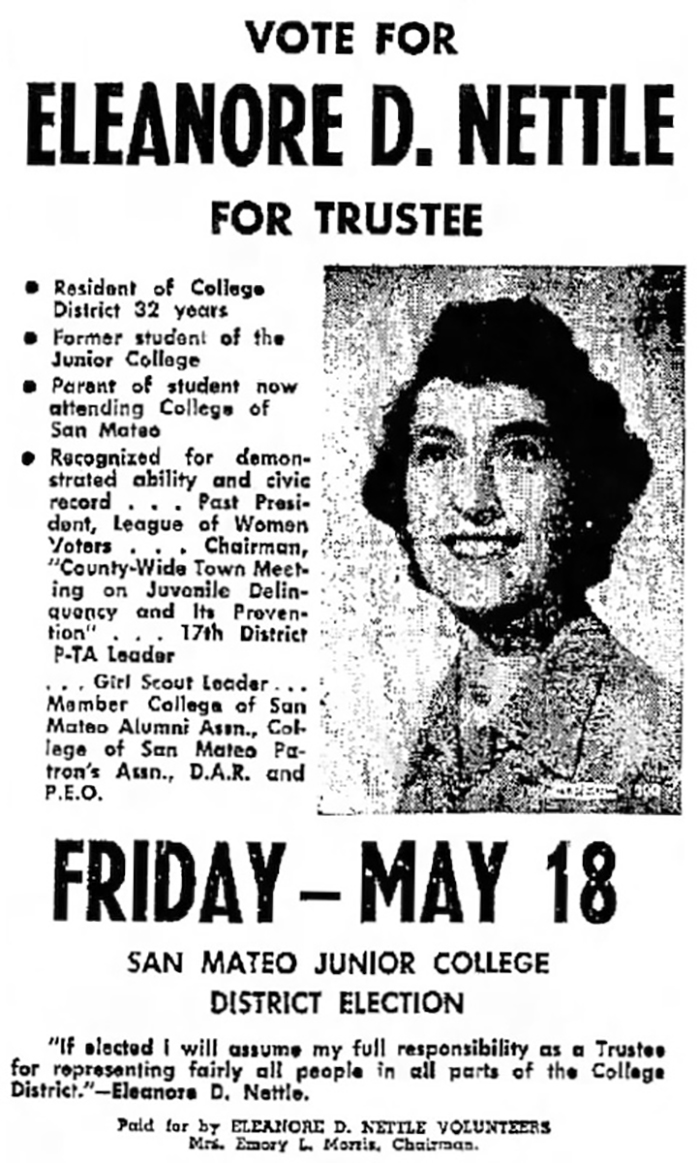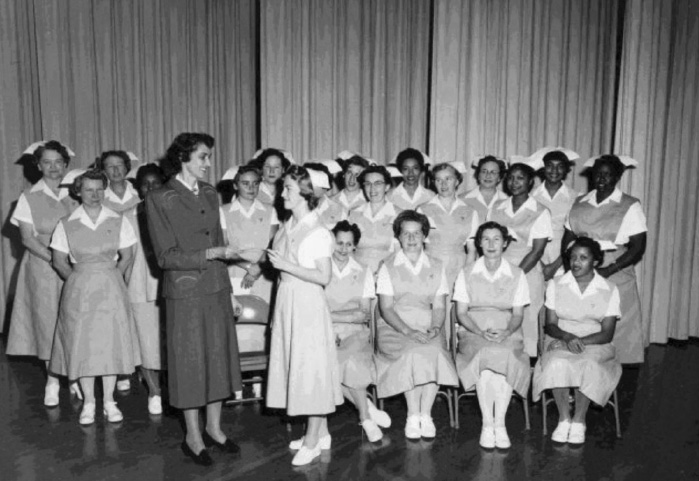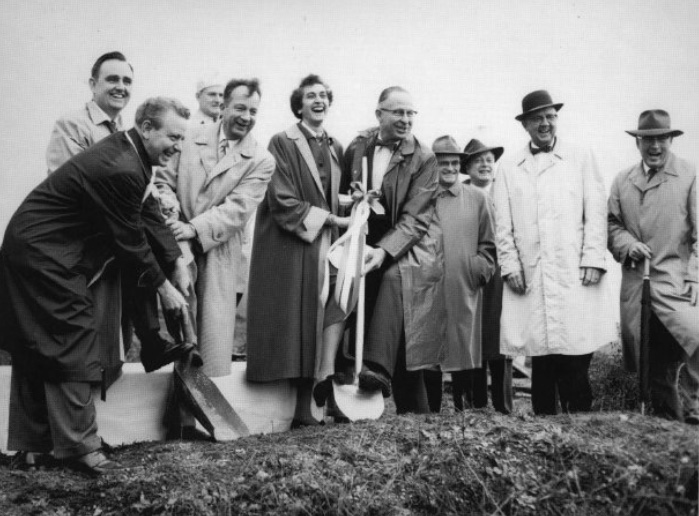Eleanore Druehl Nettle (Class of 1933)
Women’s president of San Mateo Junior College
Served 33 years on San Mateo Community College District Board of Trustees
Led planning and construction of today’s three-college district
Member, California Higher Education Coordinating Council
Eleanore Druehl Nettle served longer and, arguably, fostered more change than anyone else on the San Mateo County Community College District Board of Trustees. In her eight terms in office, from 1956 to 1989, Nettle led the growth of the District from a single school to three and from 2,700 students to more than 30,000. Nettle’s leadership in creating and executing the District’s master plan for this dynamic change inspired Gov. Edward “Pat” Brown to name her to the state Coordinating Council for Higher Education. There, she helped to oversee California’s renowned Master Plan for Higher Education, a much-copied blueprint to make public higher education accessible to all.
Nettle’s achievement is all the more remarkable because it began when there were very few female elected officials in California.
When Nettle won her seat on the Board of Trustees, only 16 of 531 members of Congress were women. None represented California. Only three women had ever served in the California Legislature. In 1970, Nettle would unsuccessfully run to be the fifth. True, California women jumped to join public commissions and to run for office soon after winning the vote in 1911. (Female suffrage, like same-sex marriage, spread state by state before becoming U.S. law.) Yet partisan politics was largely considered a male domain, tough and tricky, conducted in smoke-filled rooms.
Nettle joined the fray, said her son Phil, because “she believed in higher education for all.”
“She just really thrived on community service and was really good at working with people,” Phil Nettle said. “She was instrumental in choosing those three campuses [College Heights, Cañada and Skyline] and building them out. She enjoyed the development aspects—the bond measures, choosing the design firms.”
In fact, most of Phil Nettle’s memories of his mom revolve around politics and CSM, which he and his two siblings attended.
“I learned to drive on the Delaware campus because they had a road going through it,” he said. “I remember greeting steam trains at the Burlingame train station for Arthur Younger’s congressional race. She was his women’s campaign manager.”
Younger repaid the favor by leaning on the Federal Communications Commission to grant KCSM-TV a broadcast license, and by finding funds to extend Highway 92 to the College Heights campus that Nettle’s leadership made possible.
Eleanore Nettle (1913–2001) was born in Salt Lake City and moved to San Mateo County with her parents as a child. At Burlingame High, she was a fierce competitor on the women’s basketball team. Entering then-San Mateo Junior College in 1931, she was elected women’s president of the Class of 1933. She married Matson Navigation executive Lester Nettle, settled in San Mateo and served with many boards and women’s groups involved in education and at-risk youth. As president of the county League of Women Voters, she launched a two-year study of the College and its needs.
She was spurred in 1954 by the embarrassing news that authorities had slashed CSM’s accreditation from five years to three until it committed to plans for a single, unified campus. CSM students were then shuttling among three makeshift, obsolete sites—Delaware, Baldwin and Coyote Point. Though locals valued the College and its many cultural gifts, the Depression, World War II and top-level deadlock had brought planning to a standstill.
Some trustees wanted CSM to expand at its Delaware campus. Others wanted the College to acquire Coyote Point permanently and to upgrade buildings there.
Nettle ran on a pro-growth, future-facing platform. Setting an example other local women would follow, she tapped the voting power of her many women’s groups, the PTA, her Methodist church, and the other networks of her highly gendered 1950s social life. On her first run in 1955, she came in third. The next June, bolstered by all-female campaign coffees that were covered on the society pages of local papers, she sought another vacant seat and won. On taking office in 1956, Nettle became the impetus behind the District’s 25-year Master Plan. It called for today’s three-campus system and sought a range of public input including that of tech executives and union leaders, who had insights into San Mateo County’s future job needs. When College Heights held its groundbreaking in 1960, Nettle was honored to turn the first shovelful of dirt.
She was a natural conciliator and given to deep study of any issue, her son said. “She was very fiscally responsible,” Phil Nettle said. “She was always worried about budgets and funding.” These qualities came in handy after state Prop. 13 slashed property tax revenues partway through her service on the board.
For years, Nettle fought community colleges’ imposition of student fees, both on a district level and through the California School Boards Association, where she was elected president in 1968. She was an early critic of KCSM-TV’s soaring costs, casting the sole board vote against a $450,000 federal grant for color conversion “when human and educational needs are being neglected.”
“I want to emphasize how highly she thought of the faculty,” Phil Nettle said. “Our dinner table talk was often about the budget, what a certain department needed and how to get it. She always backed them up. She told me those were professional teachers who loved their work.”
Nettle ran unsuccessfully for the state Assembly in 1970, losing in a crowded Republican primary to Dixon Arnett.
Though she was a lifelong Republican, her son said her many political mentees included Rep. Anna Eshoo, a Democrat and Cañada College graduate who entered Congress in 1993. Eshoo attended Nettle’s memorial service in 2001 and read a tribute to her into the Congressional Record to “a distinguished American, an extraordinary Californian, a beloved friend and an institution in San Mateo County.”
If Eleanore Nettle had been born later, what would she be doing?
“She’d be heavily involved in politics, though she wouldn’t be happy with the way the Republican Party is going,” Phil Nettle said. “Maybe she’d be a college administrator. Possibly a college president.”
The county Commission on the Status of Women named her in 1990 to the San Mateo County Women’s Hall of Fame. Each year, the SMCCCD Foundation offers an Eleanore D. Nettle Scholarship to a student “with an avowed interest in education with intent to enter the teaching profession.”
